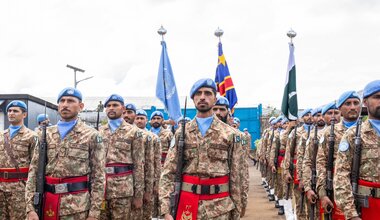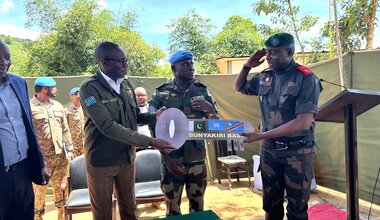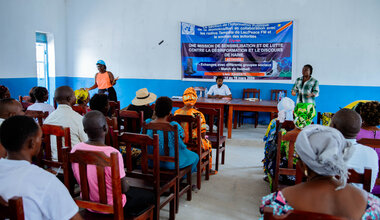MONUSCO and Partners Analyze Risks Associated with community Conflicts in South Kivu
South Kivu, 22 April 2015 — In Bukavu, the Civil Affairs section of MONUSCO brought together State and Non-State actors, including humanitarian agencies, for a three-day workshop starting from Wednesday 22 April 2015, to analyze risks associated with community conflicts and to plan appropriate actions. Twenty-five members from the aforementioned structures took part in this workshop.
According to the Civil Affairs section of MONUSCO, the workshop’s main objective was “to help promote peace and stability in South Kivu province through sound management of community conflicts.” Civil Affairs officer Emmanuel Cimanuka said there was need for actors to become aware of the different problems currently threatening peace in the province, as well as the associated levels of risk or degrees of nuisance. This workshop, said he, aimed to identifying priority areas for intervention.
The workshop, of which the first edition took place on September 2012, was also designed to produce a database to serve as a reference for actors and actions in the area of conflict resolution. In South Kivu, earlier data had revealed the existence of 126 conflicts, including land conflicts, conflicts over traditional power control or control over natural resources, politico-administrative conflicts, conflicts arising ethnic rivalries. For the period 2014 to 2015, the workshop participants identified 162 conflicts, 52 of which taking place in Kalehe territory alone. This conflict mapping interests both national and international State and non-State actors, Mr. Cimanuku said.
Firmin Massagnou, head of the Civil Affairs section, stated that the problems, and especially the community conflicts, besetting the eastern DRC are complex and cannot be addressed by the government alone. He said different partners, including civil society organizations and international organizations, should bring their support to help alleviate the plight of the Congolese population. Mr. Massagnou, however, lamented the fact that every few actions had been implemented since the establishment of the Provincial Committee for Risk Analysis and Inter-Community Conflicts.
The participants expressed great satisfaction with the workshop. Saidi Alo-I-Bya Sango of the Church of Christ in the Congo’s Network for Organizational Innovation (RIO) commended MONUSCO’s initiative to provide a framework allowing them to identify the conflicts to be targeted in their future action plans. He expressed hopes that the recommendations of this workshop will lead to actions by both the Congolese State and other peace actors.
This workshop, which wrapped up on Friday 24 April 2015, was organized in the context of the MONUSCO Civil Affairs section’s « Conflict Management and Support Reconciliation” pillar.
Alain Likota
 ONU
ONU Nations Unies Maintien de la paix
Nations Unies Maintien de la paix


